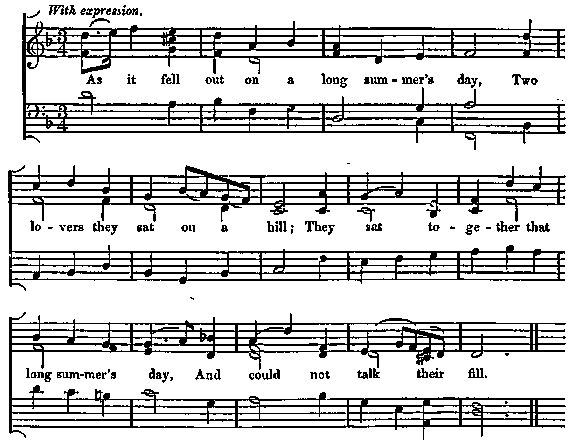Popular Music Of The Olden Time Vol 1
Ancient Songs, Ballads, & Dance Tunes, Sheet Music & Lyrics - online book
| Share page | Visit Us On FB |
|
REIGNS OP JAMES I. AND CHARLES I. |
383 |
|||
|
in his Orpheus Caledonius, and described it, with his usual inaccuracy, as " an old Scotch ballad, with the original Scotch tune;"—" old," although (on the authority of Dr. Johnson) it was first printed in Aaron Hill's Plain Dealer, No. 36, July 24, 1724, and Thomson's Orpheus was published within six months of that time—viz., on January 5,1725. The "original Scotch tune" of Thomson is a version of " Montrose's lines," or Never love thee more.
Another point deserving notice in the old ballad, is that one part of it has furnished the principal subject of the modern burlesque ballad, " Lord Lovel,"an d another that of T. Hood's song, " Mary's Ghost."
The copy in the Douce Collection is entitled " Fair Margaret's Misfortune; or Sweet William's frightful dreams on his wedding night: With the sudden death and burial of those noble lovers. To an excellent new tune."
The following version of the words is from Percy's Reliques of Ancient Poetry:— |
||||
|
|
||||
 |
||||
|
|
||||
|
I see no harm hy you, Margaret,
And you see none by me ; Before to-morrow at eight o' the clock
A rich wedding you shall see.
Fair Margaret sat in her bower-window,
Combing her yellow hair ; There she spied sweet William and his bride,
As they were a riding near. |
Then down she laid her ivory comb, And braided her hair in twain ;
She went alive out of her bower, But ne'er came alive in't again.
When day was gone, and night was come,
And all men fast asleep, Then came the spirit of fair Marg'ret,
And stood at William's feet. |
|||